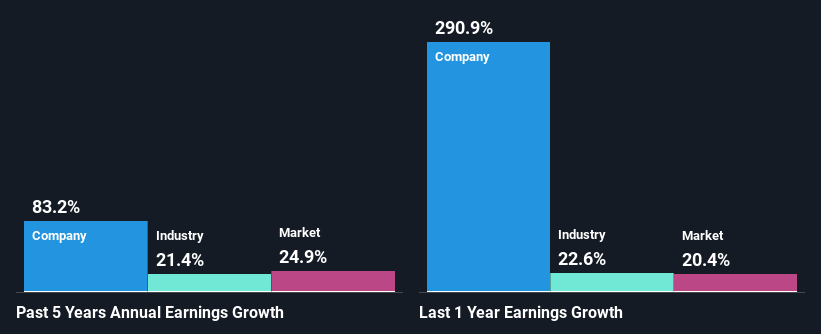Declining Stock and Solid Fundamentals: Is The Market Wrong About Nibe Limited (NSE:NIBE)?
It is hard to get excited after looking at Nibe's (NSE:NIBE) recent performance, when its stock has declined 24% over the past week. But if you pay close attention, you might gather that its strong financials could mean that the stock could potentially see an increase in value in the long-term, given how markets usually reward companies with good financial health. Particularly, we will be paying attention to Nibe's ROE today.
Return on Equity or ROE is a test of how effectively a company is growing its value and managing investors’ money. In other words, it is a profitability ratio which measures the rate of return on the capital provided by the company's shareholders.
View our latest analysis for Nibe
How To Calculate Return On Equity?
The formula for ROE is:
Return on Equity = Net Profit (from continuing operations) ÷ Shareholders' Equity
So, based on the above formula, the ROE for Nibe is:
12% = ₹291m ÷ ₹2.4b (Based on the trailing twelve months to December 2024).
The 'return' is the profit over the last twelve months. So, this means that for every ₹1 of its shareholder's investments, the company generates a profit of ₹0.12.
Why Is ROE Important For Earnings Growth?
We have already established that ROE serves as an efficient profit-generating gauge for a company's future earnings. Based on how much of its profits the company chooses to reinvest or "retain", we are then able to evaluate a company's future ability to generate profits. Assuming everything else remains unchanged, the higher the ROE and profit retention, the higher the growth rate of a company compared to companies that don't necessarily bear these characteristics.
Nibe's Earnings Growth And 12% ROE
When you first look at it, Nibe's ROE doesn't look that attractive. Although a closer study shows that the company's ROE is higher than the industry average of 8.7% which we definitely can't overlook. Particularly, the substantial 83% net income growth seen by Nibe over the past five years is impressive . That being said, the company does have a slightly low ROE to begin with, just that it is higher than the industry average. Therefore, the growth in earnings could also be the result of other factors. For example, it is possible that the broader industry is going through a high growth phase, or that the company has a low payout ratio.
We then compared Nibe's net income growth with the industry and we're pleased to see that the company's growth figure is higher when compared with the industry which has a growth rate of 21% in the same 5-year period.

The basis for attaching value to a company is, to a great extent, tied to its earnings growth. The investor should try to establish if the expected growth or decline in earnings, whichever the case may be, is priced in. Doing so will help them establish if the stock's future looks promising or ominous. Is Nibe fairly valued compared to other companies? These 3 valuation measures might help you decide.
Is Nibe Making Efficient Use Of Its Profits?
Nibe's three-year median payout ratio to shareholders is 6.6%, which is quite low. This implies that the company is retaining 93% of its profits. So it seems like the management is reinvesting profits heavily to grow its business and this reflects in its earnings growth number.
Along with seeing a growth in earnings, Nibe only recently started paying dividends. Its quite possible that the company was looking to impress its shareholders.
Summary
In total, we are pretty happy with Nibe's performance. Particularly, we like that the company is reinvesting heavily into its business at a moderate rate of return. Unsurprisingly, this has led to an impressive earnings growth. If the company continues to grow its earnings the way it has, that could have a positive impact on its share price given how earnings per share influence long-term share prices. Not to forget, share price outcomes are also dependent on the potential risks a company may face. So it is important for investors to be aware of the risks involved in the business. Our risks dashboard will have the 1 risk we have identified for Nibe.
Valuation is complex, but we're here to simplify it.
Discover if Nibe might be undervalued or overvalued with our detailed analysis, featuring fair value estimates, potential risks, dividends, insider trades, and its financial condition.
Access Free AnalysisHave feedback on this article? Concerned about the content? Get in touch with us directly. Alternatively, email editorial-team (at) simplywallst.com.
This article by Simply Wall St is general in nature. We provide commentary based on historical data and analyst forecasts only using an unbiased methodology and our articles are not intended to be financial advice. It does not constitute a recommendation to buy or sell any stock, and does not take account of your objectives, or your financial situation. We aim to bring you long-term focused analysis driven by fundamental data. Note that our analysis may not factor in the latest price-sensitive company announcements or qualitative material. Simply Wall St has no position in any stocks mentioned.
About NSEI:NIBE
Nibe
Engages in the fabrication and machining of components business in India and internationally.
Excellent balance sheet with questionable track record.
Similar Companies
Market Insights
Community Narratives





